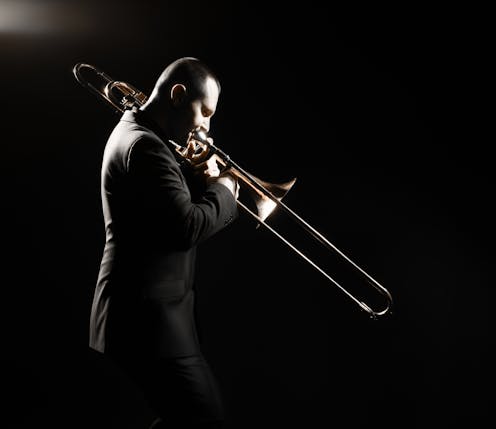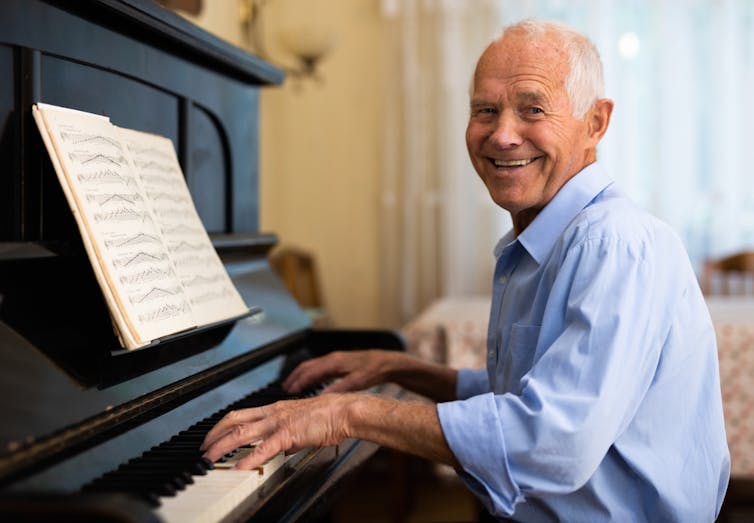
As a boy, Terry loved music and taught himself trombone, guitar and the tuba. Right through school and university he played in the evenings in jazz groups, musical theatre and marching bands. He started work as an accountant in his early twenties, but his wide social circle in the music world meant he was still out playing gigs every evening.
Even as his blossoming career began to take him around the world, he still found opportunities to indulge his passion. However, as time went on and his career took over, finding time for music became harder and harder. In the end, it petered out completely.
Similarly, Jenny was a gifted flautist and played with a national youth orchestra. But juggling her work as an administrator alongside her family made it hard for her to continue. For a while, she would take her children to summer music camps where they could play together. But eventually following her divorce and a sense that her music was becoming a bit “stale”, she stopped playing altogether and sold her flute. She didn’t play again for 18 years.
It wasn’t until they retired that both Terry and Jenny got back into their music in a serious way. Jenny was introduced to jazz by her new partner and then, following his death, was inspired by his example to join a band and experiment with different genres. Terry took early retirement, joined an orchestra and picked up all his old instruments.
Our findings
These stories came out of a recent research project that I co-authored. We spoke to a total of 33 people in the UK, all of whom had felt “called” to music in early life but then abandoned it in favour of other work, only to return to their music later. Rather than being singers, violinists or ukulele players they became IT managers, civil servants and pharmacists.
Did any of them regret the choices they made? Although some had missed music for a while, with the benefit of hindsight, none regretted the choices they had made. As Terry said:
I think it would have lost some of its lustre if I’d made a go of it and it wouldn’t have been an escape from the day job, it would be the day job. At some point I wonder if it would have become a chore.
Oliver, a clarinet player turned leadership development expert turned retiree musician, took a similar view. He talked about a musician he knew who played in the orchestra pit of The Lion King every night who would now “panic at being asked to play anything else”.
Jenny spoke for many of our participants when she said music was “like breathing”, but they also saw pursuing a musical career as fraught with risks. They talked about the lack of job security, the antisocial hours, the low pay, the hours of practice and lack of control over what music they could play.

Instead, most had pursued careers that built on other strengths and interests and that brought them a greater sense of security. From the vantage point of retirement, people could see the benefits of pursuing their calling in their later years instead.
Some, like Ron, went so far as to do a master’s degree and then a doctorate in music after he retired. Others, like Fiona, took the opportunity to explore new types of music, go to music summer schools, chair a local music society and play with a range of different groups.
While all the musicians aspired to be good at what they did, pressures from teachers, peers and family were lifted in later life. In retirement, music was about having fun, experimentation and companionship, and it didn’t matter what went wrong. Our participants enthused about the new-found joy and freedom of following their calling in their later years.
Amy said: “When I’m singing I’m in the moment, and that’s all that matters. It doesn’t matter what I look like, what anybody thinks of me.”
As Jack added:
Being good used to matter a lot to me when I was younger and that scared me off. But now you just give it a go – if it works, it works, if it doesn’t, have a laugh!
In this way, what it means to follow your calling becomes transformed over the life course from the serious, pressured experience of youth to the joy and freedom of retirement.
Caveats
It was easier for some than for others to resume their music. Those who completely abandoned music for some time – in Jack’s case 40 years, for example – certainly struggled more to get back into it. Yet even those in Jack’s position instinctively knew music was not completely lost to them:
You think of passions as something red hot and steaming, but they’re not always. Sometimes they simmer and they’re always there, always at the back. There’s this sort of beat.
Picking up their calling to music in retirement gave structure and purpose to people’s lives and meant retirement was not just about “gardening”, but about personal growth and fulfilment. It meant that life continued to have a sense of purpose and meaning.

Our participants were lucky because they all enjoyed good physical and mental health and the financial resources to afford to spend time on music. Of course, not everyone is in this position.
But for many who missed the boat first time around and didn’t follow their calling, the message is that it can still happen in a different way. As Gordon, a trombone player in his youth who became a senior IT executive and now chairs his local choral society, said:
People say, ‘keep your passion as your hobby but not your career because it will be more satisfying’. I think in retrospect that was probably sound advice.
Katie Bailey is a member of ReWAGE, and of the Work Insights Group which is part of the Involvement and Participation Association. This article is based on research conducted in collaboration with Dr Jane Sturges.
This article was originally published on The Conversation. Read the original article.







